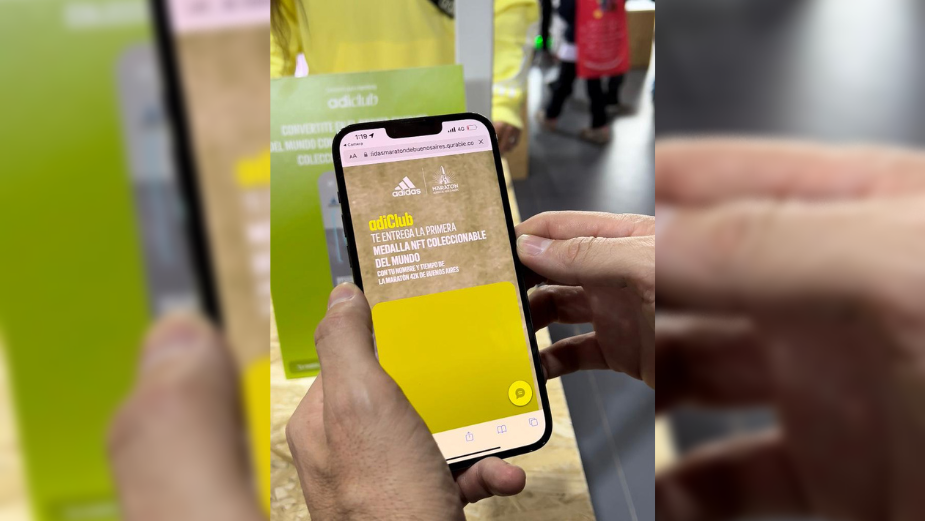How Qurable and adidas made the first ever NFT marathon medals
Qurable is a web3 platform that enables creators and brands to leverage NFTs – using blockchain reward tokens – to create new loyalty and relationships with customers. Working with adidas for the first time, Qurable created an NFT finisher medal for the Buenos Aires International Marathon – allowing participants to collect a customized digital medal that certifies their finish times and gives them access to other benefits, including adidas’ AdiClub loyalty program.
Discussing how the first-of-its-kind project came about, Federico Garcia, CEO and co-founder of Qurable, says the BA International Marathon and adidas were looking to add value and innovation to this year’s event – which provided a perfect opportunity for the company to offer a web3 element.
The race is one of the stops on the Association of International Marathons (AIMS) schedule and had over 8,500 participants in 2022. This was sufficient volume to make this activation viable for the Qurable team – assisted by adidas and the other sponsors’ willingness to understand the technology’s value proposition for the runners. Understanding the real value that these tokenized experiences can bring to users is “the most important thing,” says Federico.
“Technology itself can be interesting, but if it’s not used for the benefit of the consumer, it becomes a pure lab test. Two of Qurable’s founders (myself included) are marathon runners – and we have other runners on the team – which clearly did easier for us to understand the added value of a personal NFT with the name and time of the terminator.” He continues, “We understand the value of this new technology, and what validation and authenticity processes entail in the blockchain. We envision all marathons around the world awarding this type of medal that allows runners to live a truly decentralized experience and certify their achievements in front of any organization in the world.”
From an advertiser’s perspective, the NFT medals also add sustainable value to brands by generating sustained experiences, rather than a series of disconnected marketing actions. Collecting these tokens on the blockchain allows brands to maintain a constant relationship with runners from event to event – not to mention opening up the possibility of incorporation into existing loyalty and discount schemes.

Catering to the public’s growing desire to develop digital identities, Qurable designed the NFT medals, overseen by adidas, to incorporate the race’s branding – all with an ambition to develop a collection of NFT medals for a global community of runners. However, as Federico explains, the real experience begins after a runner collects NFT, providing value beyond just a token symbolizing a runner’s successful completion of a race. Offering exclusive content to holders of a common token is known in the web3 space as ‘Token Gating’ – and in the case of the finishers of the Buenos Aires race, the first benefit was an adidas thermal bottle which they could redeem at a local adidas shop.
Getting the runners on board and simplifying the NFT process was the most challenging aspect of the campaign, says Federico, despite the fact that Qurable eliminated many obstacles that currently exist for much of web3 use – such as the need for a crypto wallet. Thanks to the platform not requiring runners to have an existing crypto wallet, all 8,500 marathon participants received their personal medal and could get it by clicking a link. Of these participants, over 2,000 transferred their NFTs to crypto wallets, while the rest remain on Qurable’s platform.
“User familiarity with these technologies is nascent, and we wanted to guarantee an excellent user experience,” he says. “We developed the communication on social networks and a landing page… We understand that this is a moment of transition from the technology we use as consumers on the Internet, and that simplifying the transition between web2 and web3 is the key to massive adoption – under these exact terms, we was born as a company and to carry it out in a process like this was very important.”
Currently, Qurable is working on a complete experience for another international marathon, hoping to create a “tokenized community of runners”, which – with luck – will eventually lead to the involvement of other major events such as the New York, Boston and Berlin marathons . More broadly, Federico explains that the company feels a responsibility to help form a “new internet” – one that is decentralized and “preserves users’ identities”.
He says: “Everything we know today will have a digital twin in the metaverse, or will at least be tokenized. We are facing this paradigm shift, and those of us who lead the market have the responsibility to make it diverse, fair, accessible and sustainable.”


